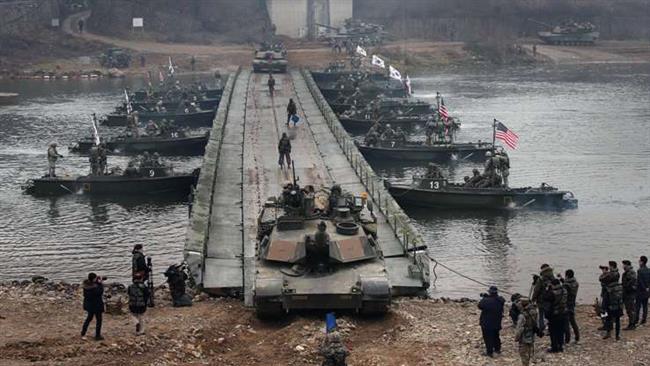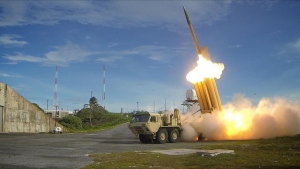WORKERS PARTY OF IRELAND STATEMENT ON THE CURRENT SITUATION ON THE KOREAN PENINSULA

US and South Korean forces practice invasion of DPRK in annual exercises involving more than half a million troops
The Workers Party of Ireland expresses its concern at the dangerous escalation of tensions in Asia and imperialist provocations, belligerent rhetoric and threats which pose a real danger to peace and which expose the world to the devastating menace of further war.
The ideological character and function of the mass media in capitalist society and the “mobilisation of bias” has been well documented. Currently, the mainstream media which is preoccupied with whipping up a frenzy about the alleged intentions of the DPRK at the same time ignores the reality of a long history of imperialist aggression and threats by the US and its allies against sovereign states including, most recently and currently, Iraq, Afghanistan, Yugoslavia, Syria, Libya, Iran and Venezuela. It also wilfully ignores the immense suffering which imperialism has visited on the Korean peninsula and the continued and continuing aggression waged by the US against the DPRK since the Korean War.
While the mainstream media has worked hard to portray a rising North Korean nuclear threat it has pointedly ignored the fact that for more than sixty years the people of the DPRK have lived with the real threat of nuclear annihilation. In 1957, in breach of the terms of the Armistice Agreement, the US introduced nuclear arms and missiles to the Korean peninsula and thereafter steadily increased their nuclear stockpile with the express design of intimidating a non-nuclear DPRK. From 1991 onwards the US openly carried out rehearsals for a long-range nuclear strike on North Korea.

THAAD missile practice launch by US army (2013)
In North Korea, by contrast, the government demand was for a denuclearised Korean peninsula free from all nuclear weapons. In 1996 the International Court at the Hague stated that the use or threat of nuclear weapons should be outlawed as the “ultimate evil”. However, it could not come to a decision whether the use of nuclear weapons for self-defence was justified in circumstances where the very survival of a state is at stake. While the US demands that the DPRK relinquishes all nuclear plans (civilian and military) the US retains a frightening arsenal of nuclear weapons and has made clear its intent to pursue and extend its nuclear hegemony. Despite repeated calls from the DPRK for a permanent Peace Treaty between the DPRK and the US to replace the Armistice (ceasefire agreement) that has been in effect since July 1953, the opening of diplomatic relations between the two states and a mutual non-aggression agreement as part of a programme to abandon nuclear and missile programmes, these offers have been consistently rejected by the US which insists on its right to make a pre-emptive nuclear strike on North Korea and to effect so-called “regime change”.
Christine Hong, associate professor at the University of California, Santa Cruz, has written that “unsurprisingly, few media outlets have reported on North Korea’s overtures to the United States, even as these, if pursued, might result in meaningful de-escalation on both sides. To be clear: peaceful alternatives are at hand. Far from being an intractable foe, North Korea has repeatedly asked the United States to sign a peace treaty that would bring the unresolved Korean War to a long-overdue end.”
In 2005, the U.S. presented an ultimatum to both Libya and the DPRK, demanding that both surrender their nuclear weapons programs. Libya complied and was promptly destroyed with “regime change” ensured. Given the belligerence of the US and its allies, their unwillingness to countenance a peaceful solution, their repeated threats of military intervention against states across the world, including the DPRK, and their recent devastating attacks on Iraq, Libya and Syria it scarcely surprising that the DPRK would take steps to ensure its survival, including the development of a defence strategy involving a nuclear deterrent. Regrettable though that course might be for those who seek a world free from nuclear weapons and other weapons of mass destruction the actions of the DPRK are, far from the “insanity” alleged by the capitalist press, an entirely rational response from the North Korean perspective.
The mainstream media has also ignored that fact that the US presence on Guam constitutes a major threat to the very existence of the DPRK. The United States has a long held “pre-emptive first strike” policy towards North Korea. It has long engaged in annual “war games” with South Korea that involve the simulated invasion and occupation of the DPRK, the “decapitation” of its leadership, and rehearsals for a pre-emptive nuclear strike. In recent years these “exercises” have become larger and more provocative. There are more than 28,000 US troops in the south of the Korean peninsula. The deployment of the US missile defence shield THAAD (Terminal High Altitude Area Defence) in South Korea constitutes a further escalation of the strategy of threats and the United States and South Korea have also recently launched their own ballistic missiles as a show of force. The U.S. military intends to permanently station an armed drone (“Gray Eagle”) on the Korean Peninsula and has been practising long-range strikes with strategic bombers, sending them to the region for exercises and deploying them in Guam and on the Korean peninsula.
And yet, at a time of escalating tensions, the mainstream media pursues its pro-US agenda, ignoring the historical and contemporary realities, disregarding decades of US aggression against North Korea and laying the groundwork for war. As we commemorate the victims of US war crimes in Hiroshima and Nagasaki we should remember that the US is the only state on the planet which has used nuclear weapons and which even today refuses to abstain from a first nuclear strike option. This week is the 72nd anniversary of the end of Japanese colonial rule on the Korean peninsula. Even, Anna Navarro, a Republican commentator, has said that Trump’s handling of the situation is “like he’s playing Battleship in between golf games.”
This is the context in which Trump’s bellicosity must be assessed.
Given their history the people of North Korea are only too familiar with the reality of imperialist aggression and war. The frightening threat of an unprovoked attack from the US, a state with a history of such actions, poses a real threat to the people of the DPRK.
The U.N. Security Council, which itself includes a number of states with massive nuclear arsenals, has voted to impose strict new sanctions on the DPRK which may cost it $1 billion a year. The WPI shares the concerns of the World Peace Council about this and other recent developments. In common with the World Peace Council we stand in solidarity with the Korean people and their right to decide their future without any foreign interference. We reject and denounce the threats by the US administration and its allies in the region against the sovereignty of the DPRK and condemn the increasing military exercises of the US, South Korea and Japan.
While, like the WPC, the WPI supports the abolition of all nuclear weapons in the world, it is unacceptable to engage in a one-sided propaganda exercise against the “nuclear program” of the DPRK, particularly, under current conditions. We support and demand a peaceful resolution of the problems of the Korean peninsula and the replacement of the armistice agreement of 1953 with a comprehensive peace accord between the US and the DPRK which includes a guarantee of non-aggression.
The present imperialist threats and the sanctions imposed by the UN Security Council which amount in reality to a form of aggression and are an obstacle to a peaceful resolution constitute an immediate danger to peace and stability in the region. In line with its internationalist position the Workers Party of Ireland opposes imperialist designs in the region, asserts the right of the DPRK to defend its sovereignty and territorial integrity, and calls for the demilitarisation and nuclear disarmament of the region and the independent and peaceful reunification of Korea.
15 August 2017
